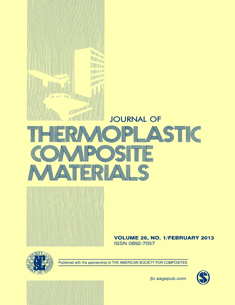
JOURNAL OF THERMOPLASTIC COMPOSITE MATERIALS
Scope & Guideline
Pioneering Insights in Ceramics and Composite Materials
Introduction
Aims and Scopes
- Thermoplastic Composite Materials Development:
The journal publishes research on the formulation, characterization, and enhancement of thermoplastic composites, including their mechanical, thermal, and electrical properties. - Processing Techniques and Methodologies:
Research articles detail various processing methods for thermoplastic composites, such as additive manufacturing, extrusion, injection molding, and thermal forming, highlighting innovations and improvements in these techniques. - Applications in Diverse Fields:
The scope includes applications of thermoplastic composites in industries such as automotive, aerospace, biomedical, and construction, focusing on their performance under specific conditions. - Sustainability and Recycling:
The journal emphasizes sustainable practices, including the recycling of thermoplastic composites and the development of bio-based materials, to address environmental concerns. - Advanced Characterization Techniques:
Papers often explore advanced characterization techniques, including mechanical testing, thermal analysis, and structural assessment to understand the behavior of thermoplastic composites.
Trending and Emerging
- Additive Manufacturing and 3D Printing:
A significant trend in recent publications focuses on additive manufacturing techniques, particularly the development of 3D printing processes for thermoplastic composites, allowing for complex geometries and tailored properties. - Sustainable and Bio-Based Composites:
There is an increasing emphasis on the development of sustainable and bio-based thermoplastic composites, reflecting global trends towards environmentally friendly materials and practices. - Nanocomposites and Functional Fillers:
Research on nanocomposites, particularly those incorporating carbon nanotubes, graphene, and other functional fillers, is on the rise, showcasing their impact on enhancing the properties of thermoplastic materials. - Multi-Functional Materials:
Emerging studies highlight the development of multi-functional thermoplastic composites that provide not only structural support but also electrical conductivity, thermal management, and other advanced functionalities. - Smart Materials and Sensors:
The integration of smart materials and embedded sensors within thermoplastic composites is gaining traction, indicating a shift towards intelligent materials that respond to environmental stimuli.
Declining or Waning
- Traditional Thermoset Composites:
Research on traditional thermoset composites is becoming less frequent as the focus shifts towards thermoplastics, which offer advantages in processing and recycling. - Basic Mechanical Properties Studies:
There is a noticeable decline in publications focused solely on basic mechanical properties, as there is a growing emphasis on multi-functional properties and advanced applications. - Static Analysis without Dynamic Considerations:
Studies that do not incorporate dynamic behavior or real-world application scenarios are waning, as researchers increasingly seek to simulate and analyze materials under realistic loading conditions. - Conventional Fabrication Techniques:
Research on conventional fabrication techniques is decreasing as innovative methods like 3D printing and hybrid manufacturing gain traction in the field. - Focus on Single-Component Systems:
There is a decline in studies that solely focus on single-component thermoplastic systems, with a growing interest in hybrid composites that combine multiple materials for enhanced performance.
Similar Journals
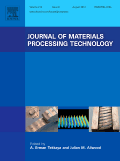
JOURNAL OF MATERIALS PROCESSING TECHNOLOGY
Driving Progress in Cutting-Edge Materials ResearchJOURNAL OF MATERIALS PROCESSING TECHNOLOGY, published by ELSEVIER SCIENCE SA, is a premier international journal dedicated to the dissemination of cutting-edge research in the field of materials processing. With an impact factor indicative of its high academic quality, this journal features a diverse range of topics, including ceramics, composites, metals, and manufacturing technologies, thereby inspiring innovations within its community. As a recognized Q1 journal across multiple categories—including Ceramics and Composites, Computer Science Applications, Industrial and Manufacturing Engineering, and Modeling and Simulation— it ranks among the top in its field. The journal's rigorous peer-review process ensures the publication of only the most significant and relevant studies, supporting researchers, professionals, and students in advancing their knowledge and expertise. With its commitment to excellence, the JOURNAL OF MATERIALS PROCESSING TECHNOLOGY remains a vital resource for those aiming to push the boundaries of materials science and engineering.

Materialia
Advancing the frontiers of materials science.Materialia is a prestigious peer-reviewed journal published by Elsevier Science Ltd, dedicated to advancing the field of materials science. With its ISSN 2589-1529, this journal has carved out a prominent place in academic research since its inception in 2018, and continues to evolve as it converges towards its 2024 objectives. Located in the Netherlands, Materialia holds a commendable Q2 ranking in the 2023 category of Materials Science (miscellaneous) and is positioned at the 72nd percentile among general materials science journals, ranking #128 out of 463 in Scopus. This accessibility to cutting-edge research and insights makes it vital for researchers, professionals, and students aiming to stay abreast of developments in this dynamic domain. While the journal operates on a traditional access model, it emphasizes the importance of rigorous peer review, ensuring that only the highest quality research is disseminated. Materialia serves as an essential platform for the exploration of novel materials, their properties, and applications, fostering innovation and collaboration within the scientific community.
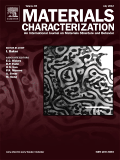
MATERIALS CHARACTERIZATION
Unveiling the Secrets of Material PropertiesMATERIALS CHARACTERIZATION is a leading international journal dedicated to the advancement of knowledge in the field of materials science and engineering. Published by Elsevier Science Inc, this esteemed journal has been disseminating vital research since 1970 and continues to be essential for scholars and industry professionals alike. With an impressive impact reflected in its Q1 quartile rankings across several categories—including Condensed Matter Physics, Materials Science, Mechanical Engineering, and Mechanics of Materials—MATERIALS CHARACTERIZATION stands out as a premier outlet for innovative studies and technical advancements. Researchers can access a wealth of peer-reviewed articles that explore properties, characterization techniques, and applications of materials, fostering interdisciplinary collaboration. With a commitment to high-quality research and comprehensive review processes, the journal plays a crucial role in shaping the future of materials science, making it an invaluable resource for anyone invested in this dynamic field.
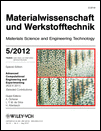
MATERIALWISSENSCHAFT UND WERKSTOFFTECHNIK
Bridging Theory and Application in Materials Technology.MATERIALWISSENSCHAFT UND WERKSTOFFTECHNIK, published by WILEY-V C H VERLAG GMBH, is a prominent journal dedicated to the field of materials science and engineering. With its ISSN 0933-5137 and E-ISSN 1521-4052, this journal serves as a vital resource for researchers and professionals engaged in exploring the intricate relationships between the properties of materials and their applications. Established in 1970 and continuing through 2024, the journal has been consistently recognized in various categories, achieving a Q3 ranking in 2023 across Condensed Matter Physics, Materials Science (miscellaneous), Mechanical Engineering, and Mechanics of Materials. Although it does not offer open access, its high-quality peer-reviewed content is fundamental to the advancement of knowledge within its three key areas: novel material development, material characterization, and application of materials in engineering contexts. As a driving force in the scientific community, MATERIALWISSENSCHAFT UND WERKSTOFFTECHNIK continues to cater to the curiosity of aspiring students, seasoned professionals, and researchers alike, facilitating a deeper understanding of the complexities of material technology.
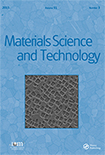
MATERIALS SCIENCE AND TECHNOLOGY
Unveiling the Future of Materials TechnologyMATERIALS SCIENCE AND TECHNOLOGY is a leading journal published by SAGE PUBLICATIONS INC, focusing on the interdisciplinary advancements in the field of materials science. Since its inception in 1984, the journal has provided a platform for researchers and industry professionals to present innovative findings through rigorous peer-reviewed articles. The journal holds a commendable impact factor and categorizes itself within the prestigious Q2 rank in various domains such as Condensed Matter Physics, Materials Science, Mechanical Engineering, and Mechanics of Materials according to the 2023 Quartiles. With no Open Access option, it primarily serves as a repository for in-depth studies and advancements that push the boundaries of materials engineering and application. Located in the United Kingdom, at 2455 TELLER RD, THOUSAND OAKS, CA 91320, the journal continues to attract a global readership, making it indispensable for academics, researchers, and students who aim to stay at the forefront of materials innovation.

Composites Part C: Open Access
Pioneering Research in Materials ScienceComposites Part C: Open Access, an esteemed journal published by Elsevier, is at the forefront of research in the fields of Ceramics and Composites, Mechanical Engineering, and Mechanics of Materials. Launched in 2020, this fully open-access journal facilitates unparalleled access to significant advancements in composite materials, ensuring that research findings are disseminated widely and freely throughout the global academic community. With an impressive Q1 ranking across multiple related categories and robust placements in Scopus rankings, specifically #78 in Mechanical Engineering and #24 in Materials Science, the journal serves as a vital platform for researchers, professionals, and students to publish their work and engage with cutting-edge studies. It aims to foster innovation and collaboration in the development and application of composite materials and their technologies, making it an indispensable resource for anyone invested in these dynamic fields.

COMPOSITES PART A-APPLIED SCIENCE AND MANUFACTURING
Transforming Ideas into Cutting-Edge ApplicationsCOMPOSITES PART A-APPLIED SCIENCE AND MANUFACTURING, published by Elsevier Science Ltd, is a premier international journal that serves as a vital platform for the dissemination of high-impact research and innovation in the fields of composite materials and manufacturing technologies. With an impact factor that reflects its outstanding reputation, this journal is categorized in the Q1 quartile for both Ceramics and Composites and Mechanics of Materials, positioning it among the top journals in these disciplines. It holds impressive ranks in Scopus, specifically Rank #16 out of 398 in Engineering - Mechanics of Materials and Rank #10 out of 127 in Materials Science - Ceramics and Composites, reinforcing its authoritative stance in the field. Spanning from 1996 to 2024, the journal features a wide array of research articles, reviews, and case studies that collectively enhance understanding and foster advancements in composite materials. With an open access model facilitating wide dissemination, COMPOSITES PART A is indispensable for researchers, professionals, and students striving to push the boundaries of materials science and engineering.

Acta Metallurgica Slovaca
Unlocking the potential of metals and alloys through open access.Acta Metallurgica Slovaca is a distinguished open-access journal published by SCICELL SRO that has been pivotal in the field of Materials Science and Metallurgy since its inception. With a robust commitment to disseminating high-quality research, this journal covers a wide array of topics within the scope of metals and alloys. Now indexed in Scopus, it ranks 82nd out of 176 in its category, reflecting a growing influence within the scientific community. With a quartile ranking of Q3 as of 2023, Acta Metallurgica Slovaca serves as an essential platform for researchers and professionals seeking to share innovative findings and developments in metallurgical science. Open access since 2013, it ensures that research is accessible to all, fostering collaboration and engagement across academia and industry worldwide. With a converged publication timeline extending from 2009 to 2024, this journal continues to play a crucial role in advancing knowledge and addressing contemporary challenges in the metallurgy sector.

KGK-Kautschuk Gummi Kunststoffe
Connecting Theory with Practical ApplicationsKGK-Kautschuk Gummi Kunststoffe is a prominent journal dedicated to the fields of industrial and manufacturing engineering, materials chemistry, mechanical engineering, and polymers and plastics. Published by DR ALFRED HUTHIG VERLAG GMBH in Germany, this journal has established itself as a vital resource for researchers and professionals involved in the rubber, elastomers, and polymer industries since its inception in 1978. With an emphasis on contemporary advancements and emerging technologies, the journal aims to disseminate cutting-edge research and developments in the understanding of material properties, processing techniques, and applications. While the journal is categorized in the Q4 quartile across multiple disciplines in 2023, it still plays a crucial role in bridging the gap between theory and practical innovation. Researchers, professionals, and students alike are encouraged to contribute to and engage with the latest insights in this dynamic field, fostering collaboration and knowledge sharing to advance applications in industry and academia.

AIMS Materials Science
Pioneering Open Access in Materials ScienceAIMS Materials Science is an esteemed open-access journal dedicated to advancing the field of materials science. Published by the American Institute of Mathematical Sciences (AIMS), this journal has been a vital resource for researchers, professionals, and students since its inception in 2014. With an ISSN of 2372-0468 and an E-ISSN of 2372-0484, it focuses on disseminating high-quality research in materials science, ranging from general materials science to cutting-edge advancements in innovative materials applications. Currently ranked Q3 in the 2023 Scopus Materials Science (miscellaneous) category, with a ranking of 253/463, AIMS Materials Science strives to provide an open forum for scholarly dialogue and collaboration, ensuring valuable insights are accessible to the global scientific community. The journal's commitment to open access enhances its visibility and reach, further promoting impactful research in this dynamic field.